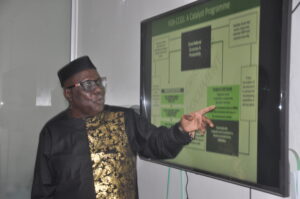As the quest to boost Nigeria’s Industrial sector for growth of the economy continues to take centre stage, an industrialist and Executive Chairman of United Technologies Limited, Otunba Aderemi Abdul-Bojela, has birthed a consumer credit scheme to stimulate growth of domestic manufacturing.
The scheme called Quality Life Improvement Plan (QLIP), is a specialised consumer credit programme designed to assist in the sustained growth of local manufacturers by way of inventory disposal through the availability of consumer credit geared towards local products and services.
Join our WhatsApp ChannelThe scheme according to Otunba Aderemi Abdul-Bojela, the scheme also provides easily accessible funds for buyers of consumer products and services to purchase items without putting excessive strain on their resources.
The industrialist and innovator, who spoke at a press briefing in Lagos on Tuesday, described how the QLIP scheme will help various facets of the economy to achieve the quantum leaps essential to becoming a developed nation.
He said the scheme will bring solutions to the tripod of challenges that successive governments have grappled with – development of the economy, job creation, and diversification beyond oil.
His words: “As a manufacturer of air-conditioning units and refrigerating equipment across decades, we encountered so many challenges and this prompted us to look for a solution to help us overcome those challenges. This search gave birth to the Quality Life Improvement Plan, a formula that has been successfully test-run with leading commercial banks, co-operative societies, and citizens.”
“QLIP is positioned to help promote local consumption, which enhances local manufacturing with a chain effect across the economy. What this translates to, in the final analyses, are increased government revenue, technological development, and increased Gross Domestic Product (GDP) while improving Nigerian’s quality of life and productivity,” Otunba Abdul-Bojela added.

He projected that the scheme will help increase manufacturing which is currently contributing less than 10 percent to the nation’s GDP to about 50 percent.
“QLIP is coming at a time when the high cost/scarcity of foreign exchange, customs duty, and power supply have forced a lot of manufacturing companies to go under. To cap it all, the increasing demand for foreign goods by consumers is draining national reserves, and further straining the national economy. Hence, QLIP’s tested blueprint for a national consumer credit scheme encouraging consumers towards made-in-Nigeria goods has attracted positive reactions.
“When we patronize made-in-Nigeria products, the impact on our economy will be enormous and it will help companies favorably compete with their foreign competitors,” says Otunba Abdul-Bojela.
He stressed that as witnessed in other advanced economies during their stages of transition, Nigeria’s economy needs series of innovations to develop.
The scheme, he said is one of the innovations that could trigger that if successfully implemented, at it would encourage local manufacturers to mass-produce goods, while reducing unit costs to be able to compete with foreign or imported ones.
“Every economy needs radical innovation to keep it growing and evolving. The Consumer Credit Guarantee Scheme is one innovation that will help the country leap-frog decades of economic down-turn and become the harbinger of Africa’s industrial revolution,” he added.
He equally pointed out that with the African Continental Free Trade Agreement (AfCFTA) in place and given the continental advantage of Nigeria, it has great advantage when its scale of production is significantly increased.
On the benefits for individual consumers, he said it helps them have access to things they need to improve quality of life without much strain on their resources.
He said one would not need to relying on long term savings to procure things they need as they pay gradually with an affordable single interest rate.
“We have to have a way to make sure that manufacturing becomes a large percentage of our GDP. Now it’s below 10%, but with this system, manufacturing will climb to almost 40 to 50% of our GDP, with all the multiplier effect, job creation, with other innovations.”
Otunba Abdul-Bojela disclosed that the scheme would serve textile, electronics, furnitures and fittings, automobile, and service industries.
Victor Ezeja is a passionate journalist with seven years of experience writing on economy, politics and energy. He holds a Master's degree in Mass Communication.


















Follow Us